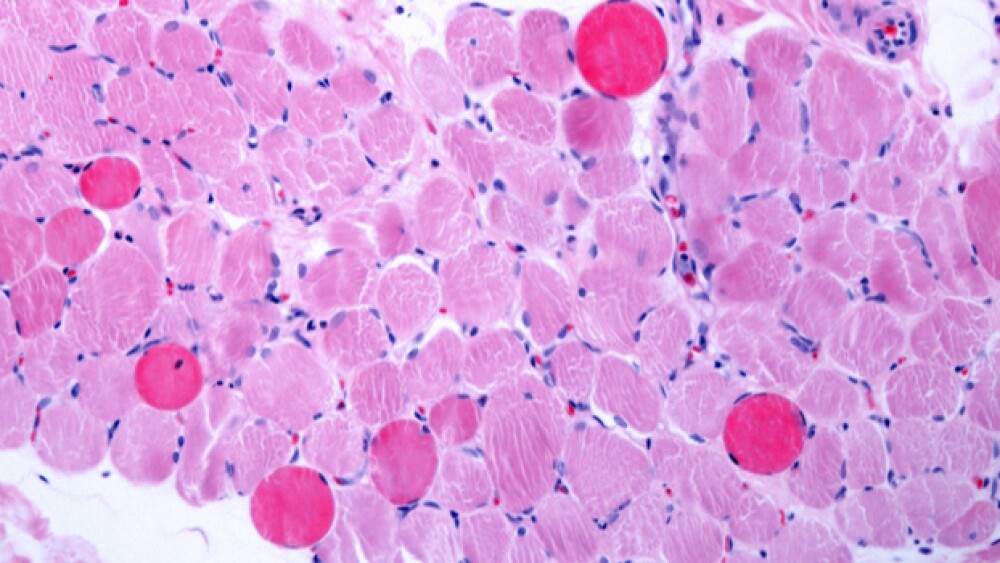In its first-quarter financial report, Solid Biosciences updated on its Phase I/II IGNITE DMD clinical trial. The progress was marred by adverse events.
In its first-quarter financial report, Solid Biosciences updated on its Phase I/II IGNITE DMD clinical trial. The progress was marred by adverse events.
One patient was dosed with 2E14 vg/kg of SGT-001 and another patient was added to the control group. Not long after dosing, however, the patient in the treatment group was diagnosed with a gastrointestinal infection. It was classified as a serious adverse event but was not believed to be related to the study drug. The patient also showed a transient decline in platelet count that was believed to be a non-serious adverse event related to the drug.
The events have fully resolved.
The patient also experienced a transient elevation of transaminases and a transient increase in bilirubin higher than two times the upper limit of normal. The patient was given increased oral glucocorticoids, which resolved the issues. It was reported to the U.S. Food and Drug Administration (FDA) as a serious adverse event related to the study drug. The patient responded and has resumed normal activities.
The company continues to enroll patients in the study.
Duchenne muscular dystrophy is a genetic disease characterized by progressive muscle degeneration and weakness. It is caused by an absence of dystrophin, a protein involved in muscle cell development and maintenance. It typically affects boys and the life expectancy is typically in the 20s.
SGT-001 is a novel adeno-associated viral (AAV) vector-mediated gene transfer. It delivers a synthetic dystrophin transgene, called microdystrophin, to the body. The microdystrophin encodes for a functional protein surrogate expressed in muscles and stabilizes essential associated proteins, including neuronal nitric oxide synthase (nNOS).
The company reported research-and-development expenses for the quarter as $23.3 million, compared to $11.9 million from the same period in 2018. The increase was primarily caused by R&D personnel and related facility costs, manufacturing costs, and clinical development costs for SGT-001. General and administrative expenses for the quarter were $7 million, compared to $4 million in the first quarter of 2018. Net loss for the first quarter was $29.6 million, compared to $15.9 million for the first quarter of 2018. The company has $94.7 million in cash, cash equivalents and available-for-sale securities as of March 31, 2019.
“We have continued to advance our programs for Duchenne muscular dystrophy over the last few months, particularly our lead microdystrophin gene therapy candidate, SGT-001,” stated Ilan Ganot, Solid Biosciences’ chief executive officer, president and co-founder. “Building on our findings from the preliminary Phase I/II clinical data that we announced in February, we initiated dosing at 2E14 vg/kg in the second cohort of patients. Now, we are working to progress as quickly as possible, and we look forward to providing additional data later this year.”
In 2018, the FDA placed a clinical hold on IGNITE DMD. In June, the agency lifted the hold. The company relaunched the trial. At the company’s third-quarter report in September 2018, it indicated there were a total of six patients in the trial and no serious adverse events have been observed.
Until the FDA approved Sarepta Therapeutics’ Exondys 51 for DMD in 2016, there were no treatments. That treatment came with controversy and a dramatic, year-long approval process, but has paved the way for a number of other companies to develop gene therapies for the disease.
Earlier this year, Sarepta announced data from its interim analysis of muscle biopsy endpoints of its therapy casimersen for Duchenne muscular dystrophy (DMD). The interim data was strong enough to support a probable New Drug Application (NDA) submission to the FDA by mid-year.
And in April, San Francisco-based Audentes Therapeutics signed a licensing agreement and collaboration deal with Nationwide Children’s Hospital to expand its pipeline for vectorized antisense treatments for Duchenne muscular dystrophy (DMD) and myotonic dystrophy type 1 (DM1).
Audentes and Nationwide Children’s are working together to develop AT702, an AAV-antisense therapy candidate engineered to induce exon 2 skipping for DMD with duplications of exon 2 and mutations in exons 1-5 of the dystrophin gene.





